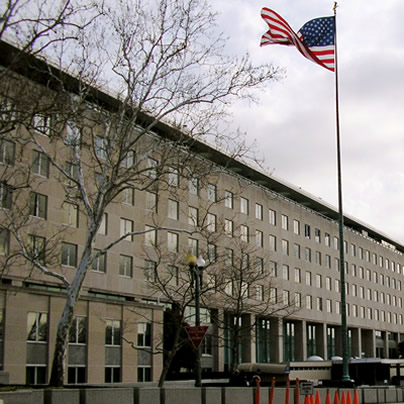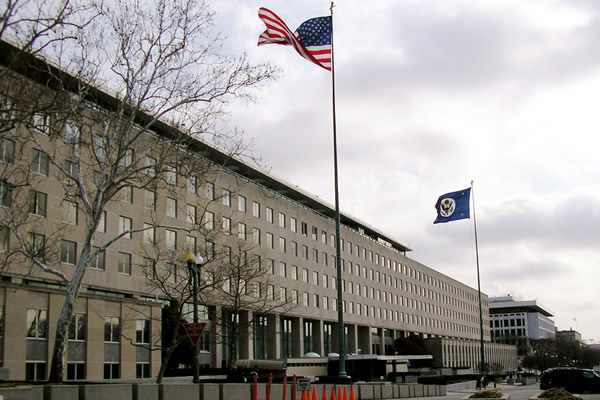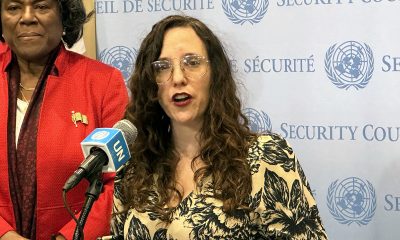News
State Department ‘trying to confirm’ arrest of Nigeria gays
Following signing of anti-LGBT law, AP reports ‘dozens’ arrested


The State Department says it’s looking into the veracity of reports that gay activists are being arrested in Nigeria. (Photo public domain)
The State Department is looking into media reports that authorities in Nigeria are arresting dozens of LGBT activists in the aftermath of passage of an anti-gay law in the country.
Under questioning from the Washington Blade, State Department Deputy Spokesperson Marie Harf said reports of arrests in Nigeria are “very troubling” if true.
“We’re trying to confirm those reports,” Harf said. “I’ve seen them. We don’t know if they’re true or not. If they are true, that would obviously be very troubling. Again, our team is continuing to check on the ground to get new facts to see what’s actually going on.”
According to a report on Tuesday from the Associated Press, human rights activists in Nigeria claim police are working off a list of 168 suspects — purportedly obtained through torture — to arrest dozens of gay men in the country. A police official reportedly denied any use of torture, and accounts of the number of arrests vary from as low as 11 to as high as 38.
Shawn Gaylord, advocacy counsel to Human Rights First, said the reports of arrests demonstrate the impact of the new anti-gay law in Nigeria, which was signed last week by Nigerian President Goodluck Jonathan.
“This is truly the worst case scenario,” Gaylord said. “When discriminatory bills like this are passed, we are always concerned that they set the stage for violence and ill treatment in society even when they are not enforced. But the fact that this law is being enforced so quickly and forcefully demonstrates the full extent of Nigeria’s human rights crisis.”
Under the new anti-gay law in Nigeria, same-sex marriage and same-sex “amorous relationships” are banned as well as membership in LGBT groups. The statute contains a provision allowing punishment of up to 14 years in prison for attempting to enter into a same-sex marriage.
After being unable to answer some questions from the podium on Monday for the Blade regarding the anti-gay law, Harf on Tuesday offered some answers.
For starters, after saying that passage of the law is inconsistent with Nigeria’s international legal obligations, Harf was able to identify which obligation the law violates: the International Covenant on Civil & Political Rights. Nigeria joined the 167-party agreement that aims to protect the civil and political rights of individuals in 1993.
“The Same Sex Marriage Prohibition Act not only prohibits same-sex marriage in Nigeria; it also includes broadly worded provisions implicating the rights to the freedoms of expression, peaceful assembly and association that are set forth in the ICCPR,” Harf said. “So, when we were talking about international law, that’s what we were referring to.”
Harf also clarified which U.S. officials spoke with officials in Nigeria prior to passage of the anti-gay law, saying they consisted of individuals at the U.S. Embassy in Abuja, the U.S. consulate general in Lagos and Washington officials. These officials, Harf said, helped Nigerians who support LGBT rights chart a course to “support the LGBT community there and to help Nigerians who are opposed to discrimination against the LGBT community.”
Still, Harf said she didn’t have an answer to a previous inquiry about whether U.S. officials had any knowledge that Jonathan would sign the legislation before he took that action.
Will Stevens, a State Department spokesperson, later said the U.S. government has been monitoring the legislation for some time.
“We have been closely monitoring the progress of this law as it moved through the legislative process and have engaged regularly with the [government of Nigeria] and civil society on our concerns about the proposed legislation,” Stevens said.
Additionally, Harf said she didn’t have any announcements about conversations the U.S. would have in the future about the Nigerian government on the anti-gay law, but said the administration would continue to voice concerns given the opportunity.
“One thing I learned to do is not make predictions from the podium about anything,” Harf said. “Like I said, I don’t have anything to announce about any conversations. We regularly raise it. I’ve been very clear from here about our position. If we have any updates, then I’m happy to let you know.”
Also on Tuesday, the United Nations High Commissioner for Human Rights Navi Pillay spoke out against the anti-gay law, marking the first statement against the statute by the intergovernmental organization.
“International human rights law and jurisprudence clearly indicate that states have a legal duty to protect all individuals from violations of their human rights, including on the basis of their sexual orientation,” Pillay said. “Disapproval of homosexuality by the majority on moral or religious grounds does not justify criminalizing or discriminating against LGBT persons.”
Pillay urged the high court in Nigeria to examine the constitutionality of the new law at the next opportunity.
For its part, Harf acknowledged the State Department is concerned that passage of the anti-gay law in Nigeria represents a growing trend of anti-gay activity in Africa.
“We are deeply concerned by some of the recent developments we have seen in Africa with respect to human rights of LGBT individuals, including passage of the ‘Anti-Homosexuality Bill’ by Uganda’s parliament and also increasing arrest of LGBT individuals in countries, such as Cameroon and Zambia,” Harf said. “Human rights are a cornerstone of our foreign policy; we say this all the time, and we will continue to support the efforts of our human defenders in Africa and across the globe who are working to end discrimination against LGBT persons.”
District of Columbia
Taste of Point returns at critical time for queer students
BIPOC scholar to speak at Room & Board event on May 2

The Point Foundation will kick off May with its annual Taste of Point DC event. The event will be hosted at Room & Board on 14th Street and feature a silent auction, food tastings, a speech from a scholar, and more.
Point’s chief of staff, Kevin Wright, said that at Taste of Point, the scholars are the star of the show.
“People never come to an event to hear Point staff speak, they come to hear from the people most impacted by the program,” he said. “At its core Taste of Point is designed to center and highlight our scholars’ voices and experiences.”
This year, a Point BIPOC Scholar, Katherine Guerrero Rivera will speak at the event.
“It is a great opportunity to highlight the scholars out there on the front lines making impacts in almost every sector and job field,” Wright said.
Wright pointed out that this year especially is a pivotal time for LGBTQ students.
“In 2023, there were 20 states that passed anti-LGBTQ legislation,” he said. “By this point in [2024] we already have more.”
Wright said the impacts of those legislative attacks are far reaching and that Point is continuously monitoring the impact they have on students on the ground.
Last month, The Washington Post reported that states with anti-LGBTQ laws in place saw school hate crimes quadruple. This report came a month after a non-binary student, Nex Bennedict, died after being attacked at school.
“So, we see this as a critical moment to really step up and help students who are facing these challenges on their campus,” Wright said. “Our mission is to continue to empower our scholars to achieve their full academic and leadership potential.”
This year Point awarded nearly 600 LGBTQ students with scholarships. These include the flagship scholarship, community college scholarship and the BIPOC scholarship. When the foundation started in 2002, there were only eight scholarships awarded.
Dr. Harjant Gill is one of those scholars who said the scholarship was pivotal for him. Gill said he spent his undergraduate years creating films and doing activism for the LGBTQ community.
As a result, his academic record wasn’t stellar and although he was admitted into American University’s graduate program he had no clue how he would fund it.
Upon arrival to American he was told to apply for a Point scholarship and the rest was history.
“It ended up being the one thing that kept me going otherwise I would have dropped out,” he said. “Point was incredibly instrumental in my journey to becoming an academic and a professor.”
More than a decade later, Gill serves on the host committee for Taste of Point and is a mentor to young Point scholars. He said that he donates money yearly to Point and that when he is asked what he wants for a gift he will often tell his friends to donate too.
To attend the event on Wednesday, May 2, purchase tickets at the Point website. If you can’t attend this year’s Taste of Point DC event but would like to get involved, you can also donate online.
State Department
State Department releases annual human rights report
Antony Blinken reiterates criticism of Uganda’s Anti-Homosexuality Act

Secretary of State Antony Blinken on Monday once again reiterated his criticism of Uganda’s Anti-Homosexuality Act upon release of the State Department’s annual human rights report.
“This year’s report also captures human rights abuses against members of vulnerable communities,” he told reporters. “In Afghanistan, the Taliban have limited work opportunities for women, shuttered institutions found educating girls, and increasing floggings for women and men accused of, quote, ‘immoral behavior,’ end quote. Uganda passed a draconian and discriminatory Anti-Homosexuality Act, threatening LGBTQI+ individuals with life imprisonment, even death, simply for being with the person they loved.”
Ugandan President Yoweri Museveni last May signed the law, which contains a death penalty provision for “aggravated homosexuality.”
The U.S. subsequently imposed visa restrictions on Ugandan officials and removed the country from a program that allows sub-Saharan African countries to trade duty-free with the U.S. The World Bank Group also announced the suspension of new loans to Uganda.
Uganda’s Constitutional Court earlier this month refused to “nullify the Anti-Homosexuality Act in its totality.” More than a dozen Ugandan LGBTQ activists have appealed the ruling.
Clare Byarugaba of Chapter Four Uganda, a Ugandan LGBTQ rights group, on Monday met with National Security Council Chief-of-Staff Curtis Ried. Jay Gilliam, the senior LGBTQI+ coordinator for the U.S. Agency for International Development, in February traveled to Uganda and met with LGBTQ activists who discussed the Anti-Homosexuality Act’s impact.
“LGBTQI+ activists reported police arrested numerous individuals on the basis of their sexual orientation or gender identity and subjected many to forced anal exams, a medically discredited practice with no evidentiary value that was considered a form of cruel, inhuman, and degrading treatment and could amount to torture,” reads the human rights report.
The report, among other things, also notes Ugandan human rights activists “reported numerous instances of state and non-state actor violence and harassment against LGBTQI+ persons and noted authorities did not adequately investigate the cases.”
Report highlights anti-LGBTQ crackdowns in Ghana, Hungary, Russia
Ghanaian lawmakers on Feb. 28 approved the Promotion of Proper Human Sexual Rights and Ghanaian Family Values Bill. The country’s president, Nana Akufo-Addo, has said he will not sign the measure until the Ghanaian Supreme Court rules on whether it is constitutional or not.
The human rights report notes “laws criminalizing consensual same-sex sexual conduct between adults” and “crimes involving violence or threats of violence targeting lesbian, gay, bisexual, transgender, queer or intersex persons” are among the “significant human rights issues” in Ghana.
The report documents Hungarian Prime Minister Viktor Orbán and members of his right-wing Fidesz party’s continued rhetoric against “gender ideology.” It also notes Russia’s ongoing crackdown against LGBTQ people that includes reports of “state actors committed violence against LGBTQI+ individuals based on their sexual orientation or gender identity, particularly in Chechnya.”
The report specifically notes Russian President Vladimir Putin on July 24 signed a law that bans “legal gender recognition, medical interventions aimed at changing the sex of a person, and gender-affirming care.” It also points out Papua New Guinea is among the countries in which consensual same-sex sexual relations remain criminalized.

The Cook Islands and Mauritius in decriminalized homosexuality in 2023.
The report notes the Namibia Supreme Court last May ruled the country must recognize same-sex marriages legally performed outside the country. The report also highlights the Indian Supreme Court’s ruling against marriage equality that it issued last October. (It later announced it would consider an appeal of the decision.)
Congress requires the State Department to release a human rights report each year.
The Biden-Harris administration in 2021 released a memorandum that committed the U.S. to promoting LGBTQ+ and intersex rights abroad.
The full report can be read here.

Dominica’s High Court of Justice on Monday struck down provisions of a law that criminalized consensual same-sex sexual relations.
A gay man who remains anonymous in 2019 challenged sections of the country’s Sexual Offenses Act that criminalized anal sex and “gross indecency” with up to 10 years and 12 years in prison respectively. The plaintiff argued the provisions violated his constitutional rights.
The Dominica Equality and Sexual Expression Association and the Eastern Caribbean Alliance for Diversity and Equality, a group that advocates for LGBTQ and intersex rights in the region, in a press release noted the court in its ruling affirmed “the criminalization of consensual same-sex activity between adults is unconstitutional.” The groups added Justice Kimberly Cenac-Phulgence “declared that the laws commonly known as buggery and gross indecency laws, contravenes the constitution of the Commonwealth of Dominica, namely the right to liberty, freedom of expression, and protection of personal privacy.”
“It is long past time that the dignity and dreams of all Dominicans were recognized,” said DESEA Executive Director Sylvester Jno Baptiste in the press release. “We are all God’s children, and he loves us all equally. Laws that treat some Dominicans as less than others, have no place in a just society.”
Dominica is a former British colony that is located between Guadeloupe and Martinique in the Lesser Antilles.
Antigua and Barbuda, St. Kitts and Nevis, Barbados, and Trinidad and Tobago in recent years have decriminalized consensual same-sex sexual relations.
The Inter-American Commission on Human Rights in 2021 issued a decision that said Jamaica must repeal its colonial-era sodomy law. The country’s Supreme Court last year ruled against a gay man who challenged it.
A judge on St. Vincent and the Grenadines’s top court in February dismissed two cases that challenged the country’s sodomy laws.
“Decriminalization helps create an environment where LGBTQ individuals can live openly without fear of persecution, enabling them to access health care, education, and employment without facing discrimination,” said Outright Executive Director Maria Sjödin on Monday in response to the Dominica ruling. “The repeal of these discriminatory laws is a testament to the tireless efforts of activists, advocates, and allies who have long fought for justice and equality. It is a victory for human rights and a significant milestone in the ongoing struggle for LGBTQ rights in the Caribbean.”
-

 South America3 days ago
South America3 days agoDaniel Zamudio murderer’s parole request denied
-

 Maryland4 days ago
Maryland4 days agoMontgomery County police chief discusses arrest of trans student charged with planned school shooting
-

 Politics5 days ago
Politics5 days agoCourt records raise concerns about right-wing TikTok investor’s influence
-

 Commentary4 days ago
Commentary4 days agoWorld ‘isn’t much different today’











